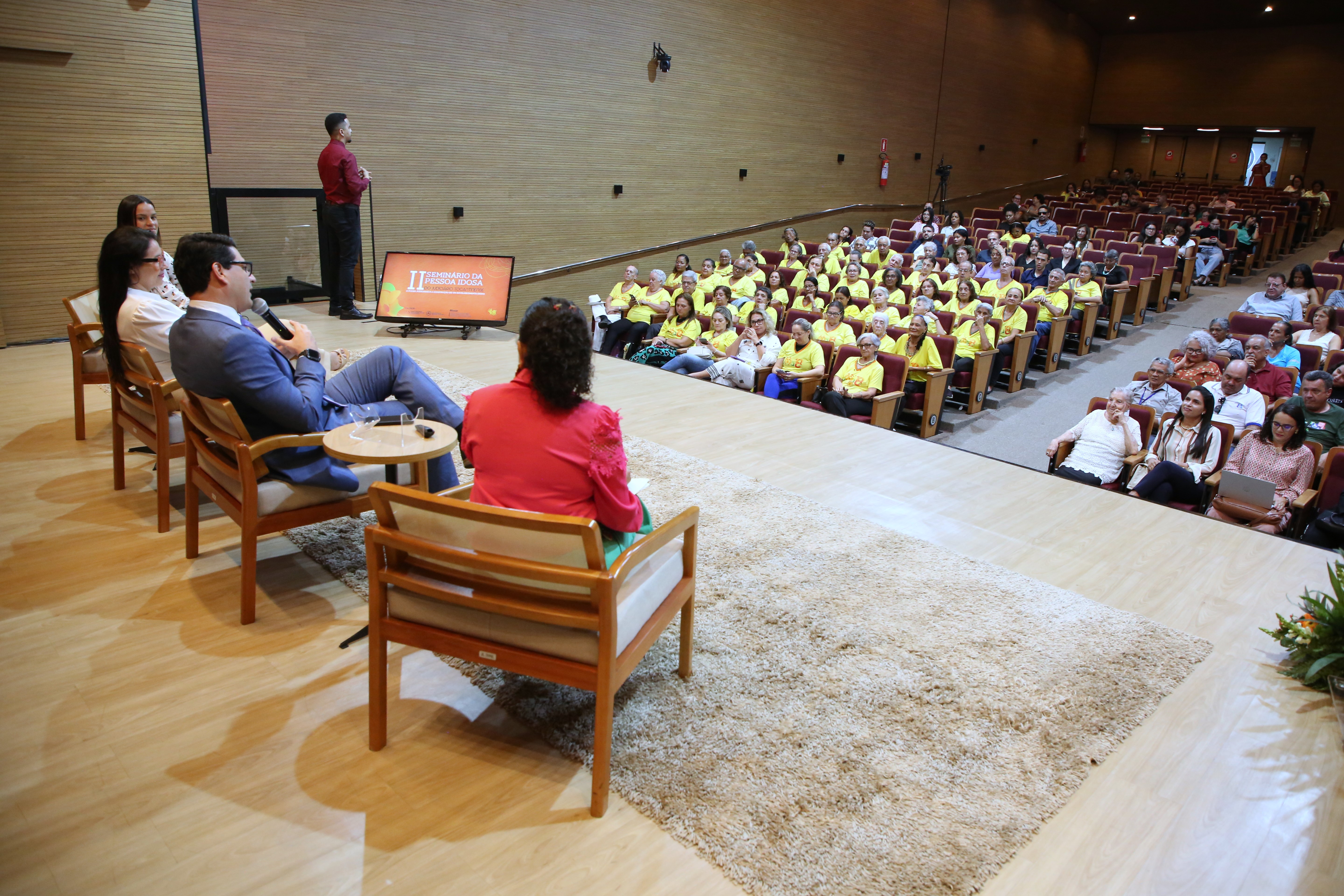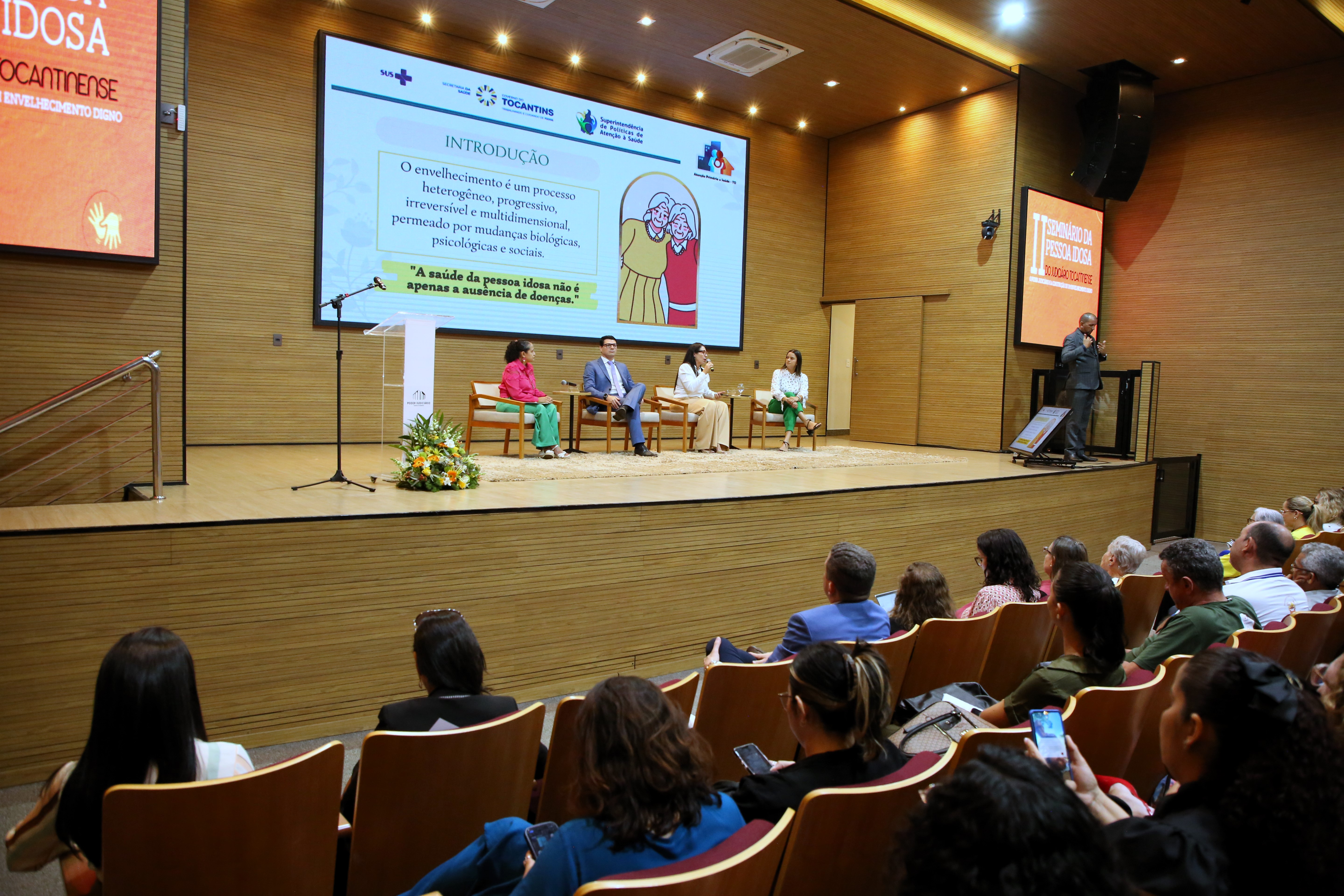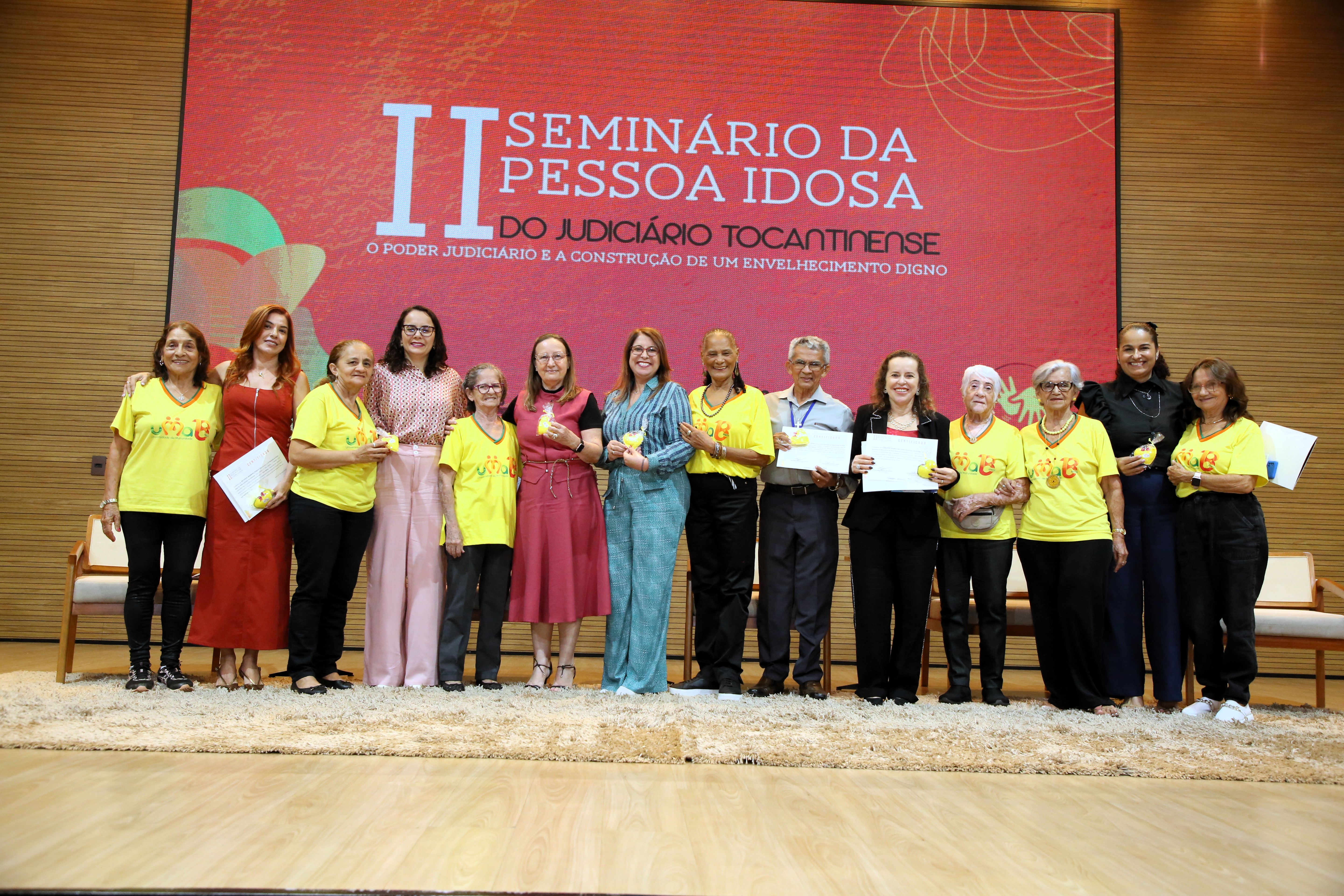
The programming of the II Seminar on the Elderly in the Judiciary of the State of Tocantins included, on the afternoon of Tuesday (October 8th), two panel discussions to deal with the defense and protection of the elderly, bringing reflections on themes such as autonomy, social inclusion and the role of the various public and private actors to ensure the dignity and quality of life of this part of the population.
Protection
In the Protection section, the debate was mediated by Érica Pollyana Oliveira Nunes, who holds a master's degree in Social Work and is a researcher with the Management Group of the Multidisciplinary Teams of the Court of Justice of the State of Tocantins (GGEM/TJTO). The panel included Cleidimar Rodrigues Soares de Abreu, Director of Primary Health Care in the State of Tocantins; Régina Mercês Aires, Social Development Analyst at the Basic Social Protection, Famíly Grant and Benefits; and Luiz Sinésio Silva Neto, coordinator of the University of Maturity (UMA/UFT).
Cleidimar Abreu, Director of Primary Health Care in the State of Tocantins, opened the conversation by highlighting the importance of autonomy and independence for the well-being of older people. She stressed that guaranteeing the ability to make decisions about the life of somebody is fundamental, not only in terms of preserving physical health, but also mental and emotional balance. For Cleidimar, autonomy, combined with functional capacity, must be a guaranteed right, allowing everyone to age actively and healthily.
“It is necessary to create an environment that favors aging in all aspects, from health support to social integration and access to fundamental rights. This environment must promote not only longevity, but also the well-being and active participation of older people in society, respecting their choices and needs,” she said.
Continuing the discussions, Régina Mercês Aires, a social development analyst at the Basic Social Protection, Family Grant and Benefits of the State Secretariat of Labor and Social Development, highlighted the importance of the social protection and assistance network for the elderly. For Régina, the Centers of Social Assistance Reference (Cras) and the Centers of Specialized Social Assistance Reference (Creas) are essential instruments for promoting the social inclusion and protection of this population.
“Ensuring that all elderly people have access to benefits and programs that promote their dignity and quality of life is essential. The quality of care is one of the most critical points within the care network, and the standardization of services must be a constant objective to ensure an efficient and empathetic response to the needs of the elderly population,” she said.
Luiz Sinésio Silva Neto, coordinator of the University of Maturity (UMA/UFT), highlighted the role of the Federal University of the State of Tocantins in the debate on human ageing in the State. He addressed the role of the University in the process of active ageing and stressed the importance of intergenerational education, which fosters the meeting and exchange of knowledge among different generations, promoting a more supportive and peaceful society.
“Education is not just a learning tool, but a way of integrating older people into society, allowing them to share their experiences and continue to learn. Continuing education is essential so that ageing is seen as a phase full of new opportunities and learning, and not as a period of limitations,” he said.
In the end, the debaters concluded that the challenge of promoting the protection of the elderly is not just a question of public policies, but of an integrated approach involving health, social assistance and education. The discussions highlighted the need to continue strengthening the social protection network, promoting humanized care and guaranteeing access to the rights of the elderly population.
Defense

The role of the institutions in protecting the elderly was highlighted in the second round table, which analyzed the challenges faced by this population in the State of Tocantins. The main problems highlighted were the high rates of domestic and property violence, as well as the difficulty in accessing essential services.
Mediated by Psychologist Keila Barros Moreira, who holds a master's degree in Science and Health and is a researcher at GGEM/TJTO, the panel was attended by Silvânia Barbosa Pimentel, a Public Defender and coordinator of the Applied Center for Minorities and Collective Actions in the city of Palmas; Valtrude Messias, President of the State Council for the Elderly; Judge Cirlene Maria de Assis Santos Oliveira, head of the Court Specialized in Combating Domestic and Family Violence Against Women; and Cynthia Assis de Paula, Prosecutor and coordinator of the Center for Assistance to Victims of Violent Crimes State Prosecution.
In her speech, Public Defender Silvânia Pimentel highlighted worrying issues affecting the elderly, such as the failure to provide help by family or caregivers, crimes of discrimination, misappropriation of property and abandonment. He stressed the importance of implementing concrete actions to guarantee dignified ageing in the State of Tocantins. “One of the essential measures is the exemption of fees for issuing duplicate documents, such as identity cards, which are not yet provided for by law in the State. This is one of the actions we are defending through the service centers. Although we have good laws, the big challenge is to put them into practice. And this will only be possible with the strong union of institutions and civil society, which play a fundamental role in this process.”
Valtrude Messias, President of the State Council for the Elderly, also stressed the importance of unity among institutions to guarantee the rights of the elderly population. “The reality for the elderly is extremely difficult. There are more than 200,000 elderly people in the State of Tocantins and our rights are not guaranteed,” she warned. “I call on young people to join in this fight too, so that together we can roll out the carpet so that no one stumbles in the parade of life. We want our rights ensured: a guaranteed ticket, housing, health, food,” she added.
Judge Cirlene Oliveira, head of the Court Specialized in Combating Domestic and Family Violence Against Women, stressed the need for effective measures to combat violence affecting the elderly, especially women.
“It is crucial that the justice system not only punishes but also prevents violence against older women. Our actions must be sensitive, integrated and effective, guaranteeing them access to all the protection and justice services they need,” she said.
According to Prosecutor Cynthia Assis, coordinated action is needed among the various protection agencies to combat crimes against the elderly. “No crime against the elderly can be ignored. We must ensure that, through coordinated action, the rights of the elderly are protected and that they receive the justice and dignity they deserve,” she said.

Closing
Closing the programming of the seminar, Judge Odete Almeida, the coordinator of the Citizenship of CGJUS, gave a special thanks to all the participants and recited a poem of her own, highlighting the main themes addressed at the meeting.
Friend time, in serene rhythm,
Life dances in harmony,
Each plot, each scene,
Is a step of wisdom.
In the movie of life, a story to tell,
A long road, love revealing itself.
The mind, a garden of memories,
The body, the time of experience.
Embracing many stories,
Living with resilience.
Happy is the heart that loves
And finds joy in simplicity.
Seek lightness and call,
The best life in this good age.
With reverence for poetry, which can be art,
To live with fullness and peace.
Accepting the cycle of life, which is part of it,
A smile that never fades.
May the years pass and the memories blossom.
May we act with affection.
May we never let go of hope,
And may we leave a legacy
Of righteousness.




_thumbnail_thumbnail.jpeg)
_thumbnail_thumbnail.jpeg)
_thumbnail_thumbnail.jpeg)
_thumbnail_thumbnail.jpeg)
_thumbnail_thumbnail.jpeg)
_thumbnail_thumbnail.jpeg)
_thumbnail_thumbnail.jpeg)
_thumbnail_thumbnail.jpeg)
_thumbnail.jpeg)
_thumbnail.jpeg)
_thumbnail.jpeg)
_thumbnail.jpeg)
_thumbnail.jpeg)
_thumbnail.jpeg)
_thumbnail.jpeg)
_thumbnail.jpeg)
